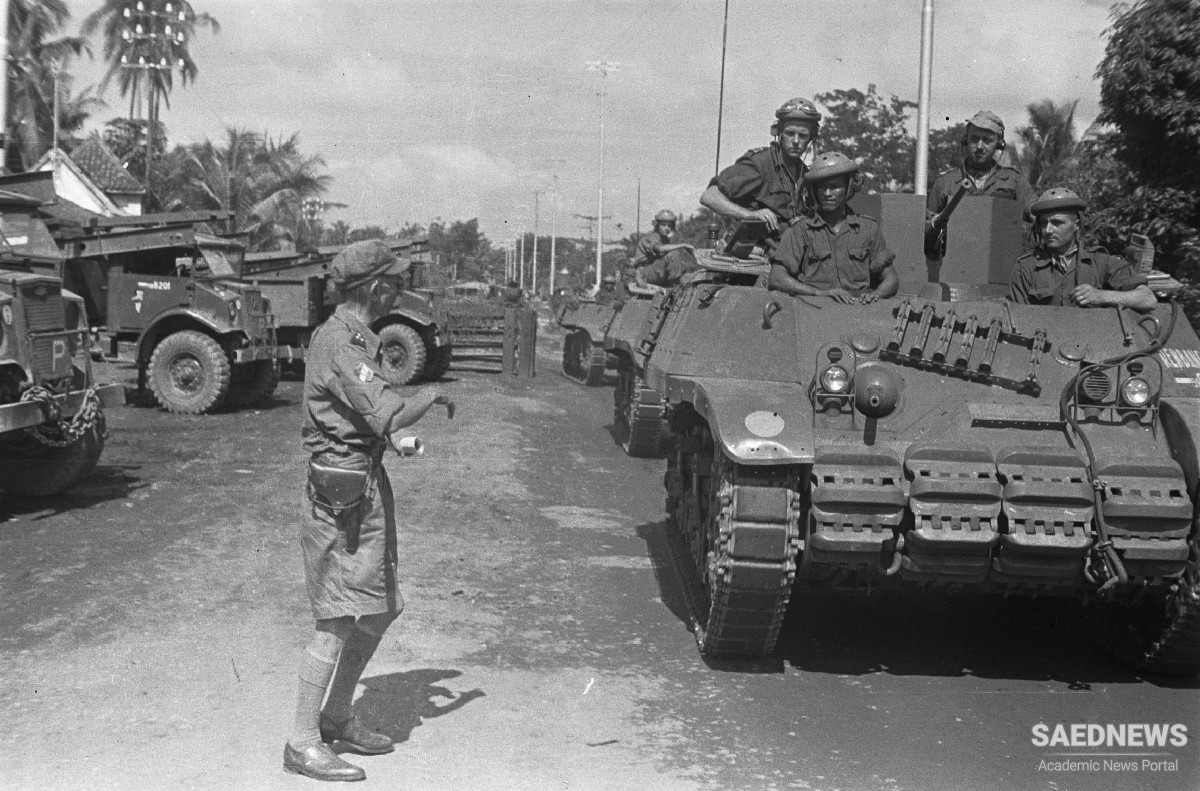And, for more than twenty years after it was born, many of the threats to the peace that the UN considered arose directly or indirectly from this source. But unhappily even questions of this type were viewed by the two blocs in cold-war terms. Each would use discussion of the item as the opportunity for a propaganda victory against the other. So it was, at first at least, with the question of Indonesia. This was originally raised at the UN, in the organisation's earliest days, as a direct result of cold-war rivalries.
It was the second of the two items raised in the Security Council by the Soviet Union in retaliation for the discussion of Azerbaijan. And as that item had been concerned primarily with the presence of Soviet Union forces on Iranian territory, so the Soviet item was directed at the continuing presence of British forces in Indonesia.
British forces had originally landed in Java in September 1945. They had been sent on the orders of the Supreme Allied Commander to arrange the Japanese surrender and reestablish law and order. The Netherlands Government held that this should lead to the return of the territories to Dutch rule. But over a month before, on 17 August, Indonesian republican leaders had declared Indonesian independence. Sukarno had been made President. And an Indonesian republican government had taken over control of most departments of government from the Japanese.
The British Government decided that its forces, which in any case were limited, should not be used to reimpose Dutch rule. They would merely secure the surrender of Japanese forces, release about 100,000 prisoners and internees, mainly Dutch, previously held by the Japanese, and occupy a few key areas around Batavia and Surabaja. Mountbatten, the Allied Commander-in-Chief, while he recognised that the Netherlands was legally the sovereign power, urged the Dutch to come to a settlement with the republicans.
In response to protests by the Indonesian authorities, he halted the landing of Dutch troops in Java and Sumatra in October. But British forces sought to win control of two or three main cities and came into conflict there with Indonesian forces seeking to resist this. In Surabaja there were casualties on both sides and a British brigadier and other British forces were killed.
The British Government announced that it had no wish to remain in Indonesia, but that it felt bound to keep its troops there for the moment, in fulfilment of Allied war aims and the orders of the Allied Supreme Command. It said it hoped for a settlement between the Dutch and the Indonesians, after which Britain would be only too pleased to withdraw. The Du tch still insisted on their legal right, as the sovereign power, to re-establish control, and they published plans for constitutional development in the territory. These plans were unacceptable to the republican government, however, which demanded acknowledgment of its de facto authority in Java and Sumatra.
This remained the situation when in January 1946 the Ukrainian delegate, on behalf of the Soviet Union, raised its complaint against Britain in the Security Council. He charged that Britain was interfering in the internal affairs ofIndonesia and assisting in the reimposition of Dutch colonial rule.
The UN should assist the Indonesians in their just demand for self-determination. He therefore proposed that the Council should set up a special commission to investigate the situation, particularly the behaviour of British forces, and restore peace in the area. Ernest Bevin, the British Foreign Secretary, representing Britain in the Council while it met in London, replied in characteristically blunt terms. He 'gave the lie' to charges that British forces had attacked those of Indonesia.
Britain had been merely carrying out Allied policy in accepting the Japanese surrender and making ready to restore the country, by mutual agreement, to the sovereign power. There was no action of British forces which required investigation: they had never provoked hostilities with anybody, though they had in some cases been obliged to defend themselves against Indonesian forces. The job for the UN was to try to secure a settlement between the Indonesians and the Dutch, not to seek to investigate the activities of British troops, which had throughout tried to stay neutral. Britain would indeed be only too pleased to withdraw her forces as soon as possible.
The Netherlands Foreign Minister, van Kleffens, also defended the conduct of British troops and denied that there was any dispute or any threat to the peace which would justify action by the UN. The problem was primarily a domestic one, which the UN had not the competence to investigate (the first of many claims of domestic jurisdiction made by colonial powers over the next twenty years). The Netherlands would therefore not accept any UN commission which was concerned with the future of the territory as a whole. If Britain would accept one to examine the conduct of British forces this was her affair. Other speakers from Western countries - the United States, France and Australia - equally rallied to the support of Britain and the Netherlands. They all either opposed the sending of a commission or said it must depend on Dutch consent. Only Mexico, other than the communist states, favoured to the idea of sending a commission.


 Middle East: Between Roman and Persian Empires
Middle East: Between Roman and Persian Empires














































